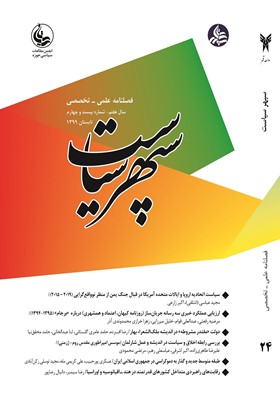دولت «مقتدر مشروطه» در اندیشه ملکالشعراء بهار
محورهای موضوعی : سیاست پژوهی ایرانی (سپهر سیاست سابق)
رضا افسرده
1
,
حامد عامری گلستانی
2
![]() ,
لنا عبدالخانی
3
,
حامد محقق نیا
4
,
لنا عبدالخانی
3
,
حامد محقق نیا
4
1 - دانشجوی دکتری علوم سیاسی، گروه علوم سیاسی، دانشگاه آزاد اسلامی، واحد اهواز، اهواز، ایران.
2 - استادیار، گروه علوم سیاسی، دانشگاه آزاد اسلامی، واحد اهواز، اهواز، ایران
3 - استادیار، گروه علوم سیاسی، دانشگاه آزاد اسلامی، واحد اهواز، اهواز، ایران.
4 - استادیار، گروه علوم سیاسی، دانشگاه آزاد اسلامی، واحد اهواز، اهواز، ایران.
کلید واژه: ملکالشعراء بهار, دولت مقتدر, رضاخان, دیکتاتوری منوّر, دولت مقتدر مشروطه,
چکیده مقاله :
وضعیت آشفته و بحرانی ایران پس از مشروطه که از جنگ و بیثباتی سیاسی ناشی میشد، موجب گردید تا ایدۀ دولت مقتدر پررنگ شود. بسیاری از نخبگان سیاسی و فکری آن زمان با درک شرایط بحرانی، این ایده را دنبال کردند و با ایدۀ دیکتاتوری منوّر راه را برای حکومت رضاخان باز نمودند. ملکالشعراء بهار از جمله کسانی بود که نخستینبار این موضوع را مطرح کرد. در این راستا، پژوهش حاضر، با بهرهگیری از روش هرمنوتیک قصدگرای اسکینر، این موضوع را مورد بررسی قرار داد. هدف این پژوهش، فهم اندیشۀ بهار دربارۀ دولت مقتدر و تمایز آن با ایدههای رایج در سالهای پایانی عصر قاجار بود، مبنی بر اینکه که بهار حاضر نبود دولت مقتدر را بدون مبانی اساسی مشروطه، یعنی آزادی، عدالت و وجود مجلسی قوی بپذیرد. انگیزۀ بهار در گرایش به ایدۀ دولت مقتدر چه بود؟ و با توجّه به نیّت اصلی بهار یعنی استبدادستیزی، برداشت او از دولت مقتدر چه تفاوتی با برداشت روزگار خود داشت؟ سوالات اصلی پژوهش هستند. در فرضیۀ نخست، مهمترین انگیزۀ بهار در گرایش به ایدۀ دولت مطلقه تأمین مصلحت کشور بود. همچنین بهار با در نظر داشتن اساس مشروطیت در حکومت مقتدر مدّ نظرش، ایدۀ دولت مقتدر مشروطه را دنبال میکرد.
Iran’s chaotic and critical condition as a result of war and political instability after Persian Constitutionalism made the idea of “powerful government” conspicuous. Realizing critical conditions back then, many political and intellectual elites followed the above idea, and by “enlightened absolutism” paved the way for the establishment of Reza Khan government. Malek al-Sho’ara’ Bahar was among those who proposed the above idea for the first time. In this regard, the present study aims to explore this subject using Skinner’s Hermeneutic Intentionalism. The purpose of this study is the realization of Bahar’s ideology of powerful government and its distinction with other common ideas within the last years of Qajar dynasty in that Bahar did not want to admit “powerful government” without basic principles of constitutionalism such as freedom, justice, and a powerful parliament. This study seeks to answer the following research questions: What was Bahar’s “motivation” for his tendency to the idea of “powerful government”? With regard to Bahar’s main “intention”, that is “anti-authoritarianism”, what was the difference between his perception of “powerful government” and the perception of society? As for the first hypothesis, the most important “motivation” of Bahar for tendency to the idea of “powerful government” was to fulfill “the expediency” of the country. Besides, Bahar followed the idea of “powerful constitutionalist government” with regard to the principle of constitutionalism in his intended powerful state.
_||_
1-30. [In Persian[
1175-1304. Translated by Mehdi Haghighatkhah. Tehran: Phoenix. ]In Persian[
225-260. ]In Persian[


